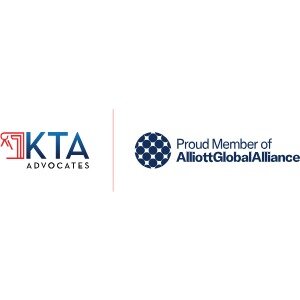Best Health insurance Lawyers in Uganda
Share your needs with us, get contacted by law firms.
Free. Takes 2 min.
Or refine your search by selecting a city:
List of the best lawyers in Uganda
About Health Insurance Law in Uganda
Health insurance in Uganda is an evolving sector aimed at improving healthcare access and quality for Ugandans. The government, through the Ministry of Health, has made it a priority to expand health insurance coverage to improve health outcomes and protect individuals against the high costs associated with medical care. Although the National Health Insurance Scheme (NHIS) has been proposed to provide wider coverage, most health insurance services are currently provided by private companies. Understanding the implications, coverage options, and legal frameworks of these health insurance schemes is essential for all stakeholders.
Why You May Need a Lawyer
There are numerous scenarios in which individuals might require the expertise of a lawyer when dealing with health insurance issues in Uganda. These include but are not limited to:
- Disputes over claim denials where an insurance carrier may refuse to cover medical expenses.
- Understanding complex insurance policy terms and ensuring proper interpretation of coverage and benefits.
- Negotiations for reimbursement of medical bills incurred out-of-pocket due to insurance delays or refusals.
- Assistance with navigating the legal process when an insurer becomes insolvent or when policies fail to meet consumer protection standards.
- Guidance on compliance with existing health insurance laws and regulations, especially for businesses offering insurance to employees.
Local Laws Overview
In Uganda, the regulation of health insurance is underpinned by several key legal frameworks and guidelines:
- The Insurance Act, which provides the legal framework for all insurance activities, including health insurance in the country.
- The proposed National Health Insurance Scheme, which seeks to offer broader coverage and equitable healthcare access to all Ugandans once implemented.
- Various directives from the Insurance Regulatory Authority of Uganda (IRA) that govern how policies are developed, marketed, and managed.
- Laws related to consumer protection which offer a degree of protection to insured individuals against unfair practices by insurers.
- Treaties and health initiatives in which Uganda is a participant, aligning with international standards in health insurance provision and regulation.
Frequently Asked Questions
What is the National Health Insurance Scheme?
The National Health Insurance Scheme (NHIS) is a proposed initiative by the Ugandan government to ensure comprehensive health coverage for all citizens. Though not yet fully implemented, it aims to pool health risks and resources to deliver affordable healthcare to the populace.
How do I choose a private health insurance plan in Uganda?
Consider factors such as the coverage scope, cost, network of healthcare providers, customer service, claim settlement ratio, and any exclusions or limitations in the policy before selecting a plan.
What are the most common health insurance disputes in Uganda?
Disputes typically arise from claim denials, misunderstandings of policy terms, delays in claims processing, non-payment settlements, and coverage exclusions.
Are employers required to provide health insurance?
Currently, there is no legal mandate requiring Ugandan employers to provide health insurance to employees; however, some companies offer it as part of their employee benefits package.
Can expatriates obtain health insurance in Uganda?
Yes, expatriates can access both international and local health insurance plans, which offer varying degrees of coverage according to specific needs and risks.
How does the Insurance Regulatory Authority (IRA) protect my rights?
The IRA ensures fair play by regulating insurance companies, addressing consumer complaints, enforcing industry standards, and overseeing financial solvency and compliance with insurance laws.
What should I do if my claim is denied?
First, review the denial letter, understand the reason for denial, and gather supporting documents. If unresolved, seek legal advice or escalate the issue to the Complaints Bureau of the IRA.
How do I file a complaint against an insurance company?
File a written complaint with your insurer first. If unsatisfied with their resolution, contact the Insurance Regulatory Authority of Uganda's complaints bureau for further assistance.
What is the role of a broker in health insurance?
Brokers act as intermediaries between insurers and clients. They help individuals and businesses identify and select the best insurance products suited to their needs by explaining terms, benefits, and options.
Are there any state-provided health services for uninsured individuals?
Yes, the Ugandan government provides public healthcare services, which, though limited in resource, are accessible nationwide. However, the quality and scope may vary from those offered by private health insurance.
Additional Resources
Here are some resources and organizations that could be helpful for individuals seeking health insurance legal advice in Uganda:
- Insurance Regulatory Authority of Uganda (IRA): The body responsible for overseeing the insurance sector and addressing consumer grievances.
- Uganda Insurers Association (UIA): Represents insurer interests and offers insights into insurance products and regulations.
- Ministry of Health Uganda: Offers updates on health policies and the implementation of the National Health Insurance Scheme.
- Consumer Protection Associations: Provide advocacy and assistance for individuals facing consumer rights issues related to insurance.
Next Steps
If you need legal assistance with health insurance issues in Uganda, consider these steps:
- Contact a lawyer specializing in insurance law for a consultation to understand your rights and options.
- Gather all relevant documentation, such as policy documents, correspondence with insurers, and medical records to support your case.
- Keep detailed records of all communications and actions taken related to your health insurance matters.
- If necessary, reach out to consumer advocacy groups or the Insurance Regulatory Authority for additional support and guidance on your case.
Lawzana helps you find the best lawyers and law firms in Uganda through a curated and pre-screened list of qualified legal professionals. Our platform offers rankings and detailed profiles of attorneys and law firms, allowing you to compare based on practice areas, including Health insurance, experience, and client feedback.
Each profile includes a description of the firm's areas of practice, client reviews, team members and partners, year of establishment, spoken languages, office locations, contact information, social media presence, and any published articles or resources. Most firms on our platform speak English and are experienced in both local and international legal matters.
Get a quote from top-rated law firms in Uganda — quickly, securely, and without unnecessary hassle.
Disclaimer:
The information provided on this page is for general informational purposes only and does not constitute legal advice. While we strive to ensure the accuracy and relevance of the content, legal information may change over time, and interpretations of the law can vary. You should always consult with a qualified legal professional for advice specific to your situation.
We disclaim all liability for actions taken or not taken based on the content of this page. If you believe any information is incorrect or outdated, please contact us, and we will review and update it where appropriate.
Browse health insurance law firms by city in Uganda
Refine your search by selecting a city.















